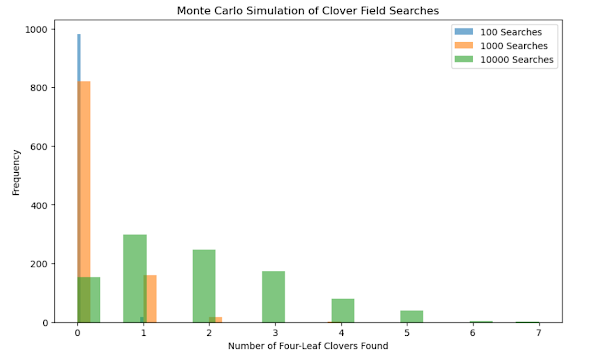Superstitial Mechanics: The Workings of Luck
Defining Luck
The rarity of a four-leaf clover is well-documented; approximately 1 in 5,000 clovers are estimated to carry this genetic anomaly. It is improbable for you to pluck out a 4 leaf clover simply by plucking a random clover off the field. Finding a four leaf clover is considered lucky due to the improbable nature of its finding. This experience of an improbable event can be considered luck.
Probability in Action: Finding the Clover
Imagine walking through a large field of clovers. Every step you take can be modeled as a random sampling process, similar to drawing lottery tickets. I modelled this in python to have the data to explore the concept of luck.
Here is a plot of these walks with frequency of finding the clover on the y axis and number of 4 leaf clovers on the x axis.
Monte Carlo Simulations: If you were to simulate 10,000 virtual walks through a clover field, the results would show that some individuals find a four-leaf clover quickly, while others might search for hours without success. This mirrors real-life randomness.Law of Large Numbers: Over the long term, if you search consistently, the probability that you find at least one four-leaf clover increases. This principle shows how luck may favor those who simply persist longer. For 10000 searches, it can be seen that there are non zero frequencies till upto 7 clovers. With an increase in number of searches, the probability of finding the clover reaches the expected probability (1/5000). This same concept can be used to explain a lot of coincidences and miracles which are often attributed to the supernatural or to the idea that the experience "means something" when really, with enough experiences, such cases are bound to happen.
From the above plot we can see how with an increase in searches, the probability of finding at least one clover increases.
Gambler’s Fallacy: Finding a clover after hours of searching doesn't mean the next one is more likely to appear. Each patch remains an independent random event. This is a common logical flaw which can heavily distort decision making.
Survivorship Bias: The narratives of people who find four-leaf clovers (or succeed in life) overshadow the countless who searched and failed, leading to a biased view of how luck works.
Notice how most searchers only find one clover, while very few manage to find two or three. This is because stories of success (finding a clover) are overrepresented. People who fail to find any clover aren’t included in the narrative, skewing the idea of how "lucky" or "common" it is to find one.
Famous Statistical Examples: Luck in Nature
Lottery Odds: While winning the lottery is purely random, entering more draws statistically improves chances. The same applies to clover hunting.
Stock Market: Investors may attribute success to skill, but randomness also plays a significant role; akin to blindly stumbling across a rare clover.
Psychological Factors: Believing in Luck
Studies show that those who believe they are lucky often persist longer in tasks. This belief primes their brain to recognize patterns faster. In clover hunting, this confidence may lead to sharper focus and greater attention to detail, subtly increasing the chance of finding one.
Conclusion
From this, it seems that luck operates with cruel irony: statistically predictable on a macro scale but a chaotic mess up close. "Fortune favors the bold" isn’t some divine proclamation but a practical truth; boldness is just stubborn probability at work. But the thing is, luck doesn’t care. You might strike gold the first time you swing, or you might die trying, empty-handed. Either way, the universe will shrug and mock you for thinking it owed you anything.





Comments
Post a Comment